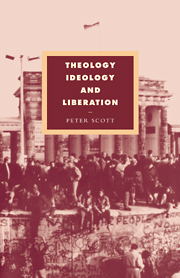Book contents
- Frontmatter
- Contents
- General editors' preface
- Preface
- Introduction
- PART I THE SHAPE OF THE ARGUMENT
- PART II LIBERATING THEOLOGY
- PART III CHRISTIAN LIBERATION?
- 5 Theology and society
- 6 Incarnation, resurrection and liberation
- 7 Society and God's trinitarian presence
- 8 Unfinished business
- References
- Index
- ADVERTISEMENT
5 - Theology and society
Published online by Cambridge University Press: 05 December 2011
- Frontmatter
- Contents
- General editors' preface
- Preface
- Introduction
- PART I THE SHAPE OF THE ARGUMENT
- PART II LIBERATING THEOLOGY
- PART III CHRISTIAN LIBERATION?
- 5 Theology and society
- 6 Incarnation, resurrection and liberation
- 7 Society and God's trinitarian presence
- 8 Unfinished business
- References
- Index
- ADVERTISEMENT
Summary
In chapter 2 I suggested that Marx considered the Christian religion to be a false intermediary; it informed human beings of their capacities but in a way that misconstrued those capacities. By contrast, communists did not require such mediation. Through chapters 3 and 4 I argued that Christian theology as second-order discourse may be interpreted in such a way as to avoid being understood as an intermediary. I stressed that theological discourse about God needs to be understood as decentred by the determining pressures of capitalist society. I sought to show that God's ‘openness’ is the mode of God's involvement in the world. This led to the argument that God's presence to the world invites material conversion.
The following chapters take the argument a little further. If part II was ‘negative’, recommending protocols that might govern a liberative theology, this part is marginally more ‘positive’. It suggests that resurrection is both the nerve of the practice of Christian liberation and is constitutive of such an account of liberation. It also suggests that an account of incarnation must be articulated against the primacy of society for an understanding of a theological theoretical practice that is neither too close nor too distant.
- Type
- Chapter
- Information
- Theology, Ideology and Liberation , pp. 137 - 173Publisher: Cambridge University PressPrint publication year: 1994



